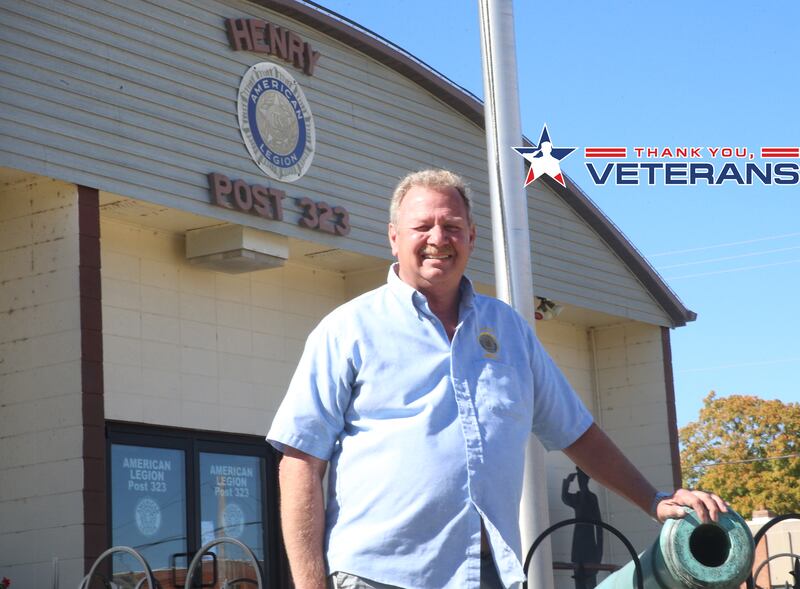Since retiring in 2017, after 34 years in the Illinois Air National Guard and the United States Air Force, Roger Masters has become a cheerleader of all things Henry. He is an active government servant, a purposeful volunteer, and he also manages to operate a successful business on the riverfront.
Masters currently serves as the legion commander for the Henry American Legion, president of the Henry Rotary, president of the Henry Zoning Board, the director for solar installation. Additionally, he has served on Henry’s board for transportation improvement and economic development.
Masters was born in Peoria and graduated from Washburn High School in 1978.
“I was in the last sixth-grade class of LaRose Elementary School,” he said.
During World War I, his grandfather served in the Army Air Corps, his father and uncle served in the Navy during World War II, and three of his older brothers also joined the service. Because three of his four brothers were in the service, Masters said that the military was not an option for his youngest brother.
The U.S. military made a policy change during World War II after all five of the “Fighting Sullivan Brothers” of Waterloo, Iowa, were killed aboard the U.S.S. Juneau, when it was sunk by a Japanese submarine, during the Battle of Guadalcanal.
Masters said he didn’t join up right after high school. He attended Illinois Valley Community College, where he met his future wife, Gina, who was from Henry. After IVCC, he became a tool grinder/sharpener and an automatic torch operator. At 22, he decided to join the Illinois Air National Guard.
“I had always wanted to serve,” Masters said. “And when CAT (Caterpillar) went on strike, it was the perfect time to go.”
He began a career as an aircraft fuel system specialist, where he oversaw the use of cryogenic fuels and gases. He also learned about unique identification systems, which were used to track the Air Force’s assets worldwide.
During his seven years with the National Guard, Masters attended drill in Peoria. He was later deployed overseas to participate in Operation Northern Watch, which began in Iraq in January of 1997. During that time, he served in Kuwait and Saudi Arabia.
“And two weeks after I returned home from Saudi Arabia, Sept. 11 occurred,” he added.
Masters intended to return to the Middle East, but the Group Commander in charge would not sign off on the medals and awards he had earned during Northern Watch, complaining that “every time I was deployed, I was recognized.”
In 2002, he joined the U.S. Air Force’s Office of the Inspector General, where he assisted in testing the readiness and compliance of bases across the country.
“I was blessed that a lot of things I did affected me, the National Guard and the Air Force in general,” Masters said.
In retrospect, he said making a career in the Air Force was never on his radar. Afghanistan, he said, gave him “the best idea of what the Air Force was doing in other countries,” such as improvements to local villages and schools.
He recounted a time he watched a young boy and girl, of different social castes, playing together in the same school – the young girl receiving an education that was previously denied by the Taliban.
As the years went on, whenever Masters encountered young airmen, he would recommend that they keep themselves busy while on mission to help the time pass – whether it was keeping a workout schedule or volunteering their time.
Of all the accolades he earned in the service, Masters is especially proud of having earned the Military Volunteer Service Medal for volunteering 2,000 hours in a two- to three-year period on top of working 12-hour workdays.
Masters retired as an E-9, a chief master sergeant, the top enlisted rank. Since returning to his late wife’s hometown, he has continued to serve in government and volunteer in Henry.
He has worked on various community landscaping projects around town, and even works with residents who need items removed from their yards – and transplants them to other locations.
And somehow, he has also managed to donate 600 platelets and blood to the American Red Cross, totalling 118 gallons over his lifetime.
“People want something to do,” he said. “If you have an idea, call an organization – even if you don’t belong – bring them your ideas. If you envision a better community, start making one. The worst ideas are the ones that are never expressed, brought forward and don’t happen.”
